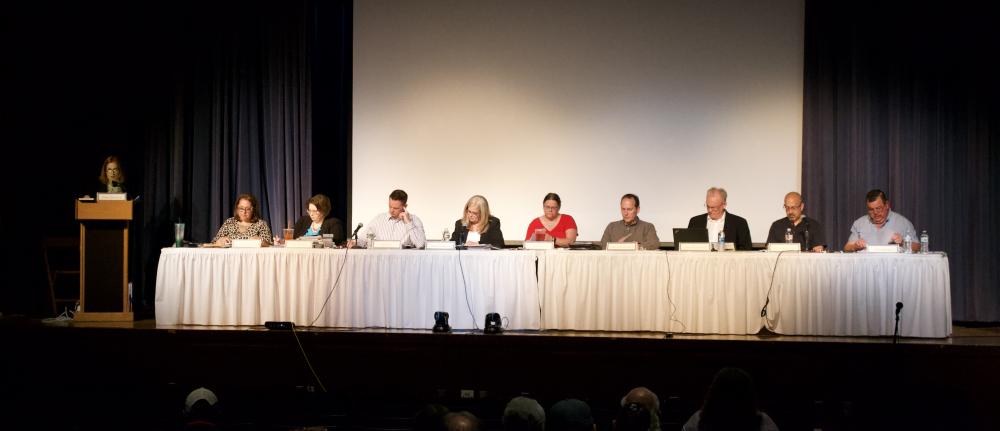Recall measures pass, zoning change fails at Lakeville Town Meeting

LAKEVILLE — Two bylaw proposals requested by residents, one hoping to alter business zoning rules and the other aiming to establish recall measures for elected positions, sparked the only discussion in what was otherwise a straightforward Town Meeting.
In the end, voters supported setting a recall process to allow elected officials to be removed from their posts. The measure requires signatures from five percent of registered voters in Lakeville, for a total of about 450 — amended during the meeting from the originally-proposed number of 300 voters — to initiate the petition and 1,000 voter signatures to call for a vote.
The measure required a majority vote, and it passed with 65 votes in favor and 49 votes against.
Opponents of the recall measures voiced concerns over the measure not containing a list of reasons where a recall could be initiated.
“If we’re going to have a recall, seeing the time it takes [bylaws] to get through the Legislature, I don’t think we should send something to them that they may find unconstitutional” due to the lack of reasons to initiate a recall, said Select Board Member Evagelia Fabian.
Supporters of the recall measures said the rules would provide a greater sense of accountability in town government.
The proposal “is not to target anybody or any situation,” said resident Brynna Donahue, who presented the article. “But when you reflect on what’s going on in our country and our world, people in power in general don’t have enough accountability, and I think you can’t have a healthy, functioning democracy without people understanding that they can be removed.”
The zoning change proposal was less successful.
Residents rejected the proposal, which would have allowed businesses of 1,500 square feet in size to build up to 7,000 square feet for “associated storage and wholesale distribution” with permission from the Zoning Board of Appeals.
The measure required a two-thirds majority to pass, but instead was rejected outright, with 77 residents voting against the measure and 28 supporting it.
“Zoning determines what’s going to happen, not what might happen,” said resident Dick Scott, who warned that passing the measure could allow uncontrollable development in town as he spoke against the proposed zoning change.
Around 115 registered voters attended the meeting on Monday, May 8, and 100 were needed to form a quorum, which is the number of voters required to be present to validate a meeting. That equals a 1.2% turnout based on the latest available tally of 9,044 registered voters in Lakeville.
Other approved measures include the government and school district budgets; making the general and zoning bylaws accessible electronically; changing the town moderator’s term from one year to three years; and paying Lakeville’s share of around $160,000 for a feasibility study to determine whether Old Colony Regional Vocational Technical High School needs renovations or a new building.
The Old Colony feasibility study will cost $1 million in total, with $500,000 coming from Old Colony’s stabilization fund, which is money set aside for unanticipated needs. Superintendent Aaron Polansky said the district added money to the fund in anticipation of the feasibility study’s cost.
The school’s member towns would pay the other half if all towns approve it. The $500,000 cost would be distributed based on the number of Old Colony students from each member town.
The portions of the cost to be paid by the towns need to be approved in all of the school’s five contributing towns — Lakeville, Acushnet, Carver, Mattapoisett, and Rochester — for the feasibility study to go ahead. So far, it has been approved in Carver and Mattapoisett in addition to Lakeville.












